NUR2300 - Systematic Review: Music Therapy for Depression Treatment
VerifiedAdded on 2023/06/04
|13
|2833
|182
Report
AI Summary
This report presents a systematic review investigating the effectiveness of music therapy for patients with depression. Using the PICOT framework, the research question explores how music therapy, compared to standard treatment, affects the quality of life and symptom management within 1 to 6 months. The review evaluates three primary research articles, including randomized controlled trials, focusing on the impact of music therapy on symptoms of depression, anxiety, sleep quality, and overall quality of life. The findings suggest that music therapy, particularly when combined with standard treatment, can significantly improve symptomatic management and enhance the quality of life for individuals with depression and co-occurring disorders. The review concludes with recommendations for future research, emphasizing the need for larger-scale, multi-center studies to validate these findings and inform clinical practice.
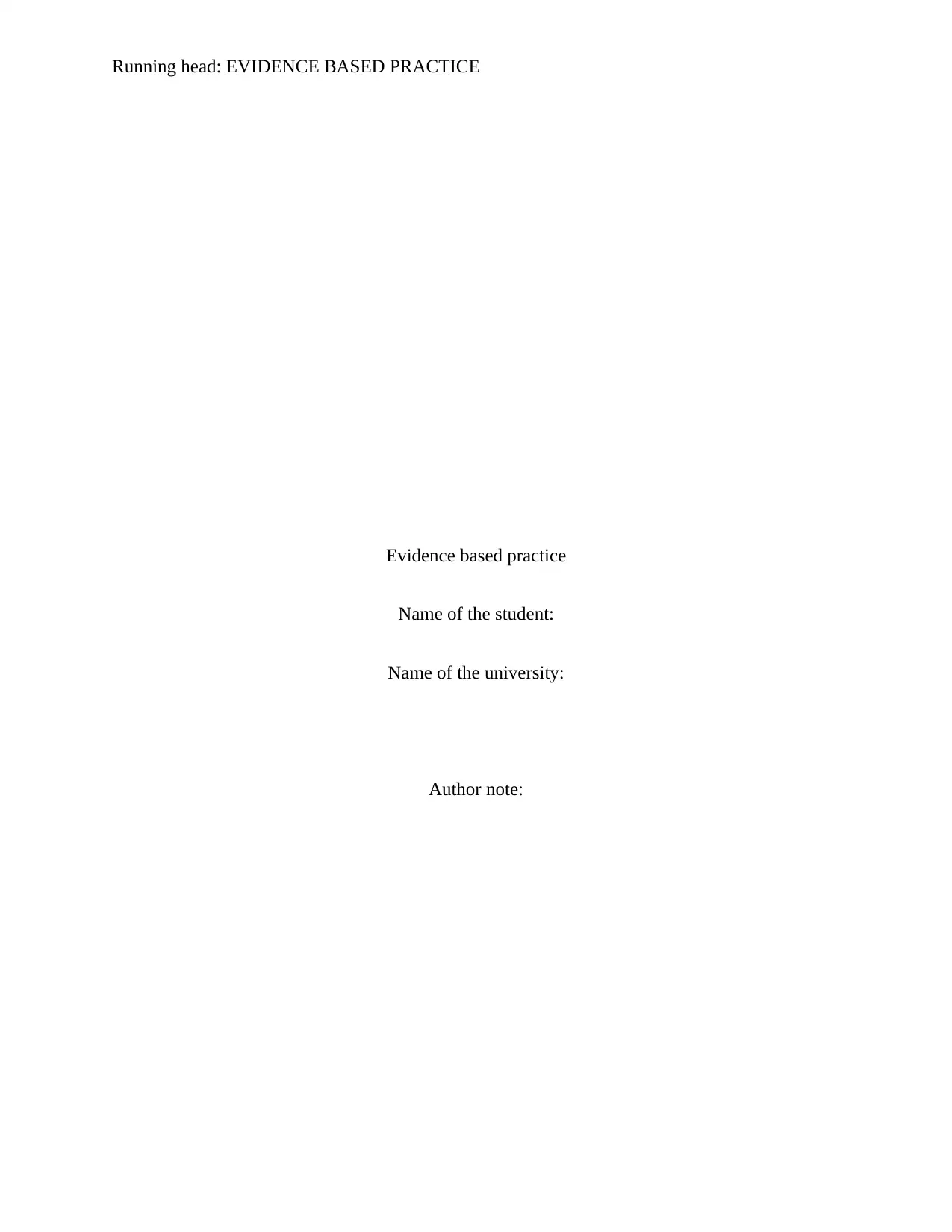
Running head: EVIDENCE BASED PRACTICE
Evidence based practice
Name of the student:
Name of the university:
Author note:
Evidence based practice
Name of the student:
Name of the university:
Author note:
Paraphrase This Document
Need a fresh take? Get an instant paraphrase of this document with our AI Paraphraser
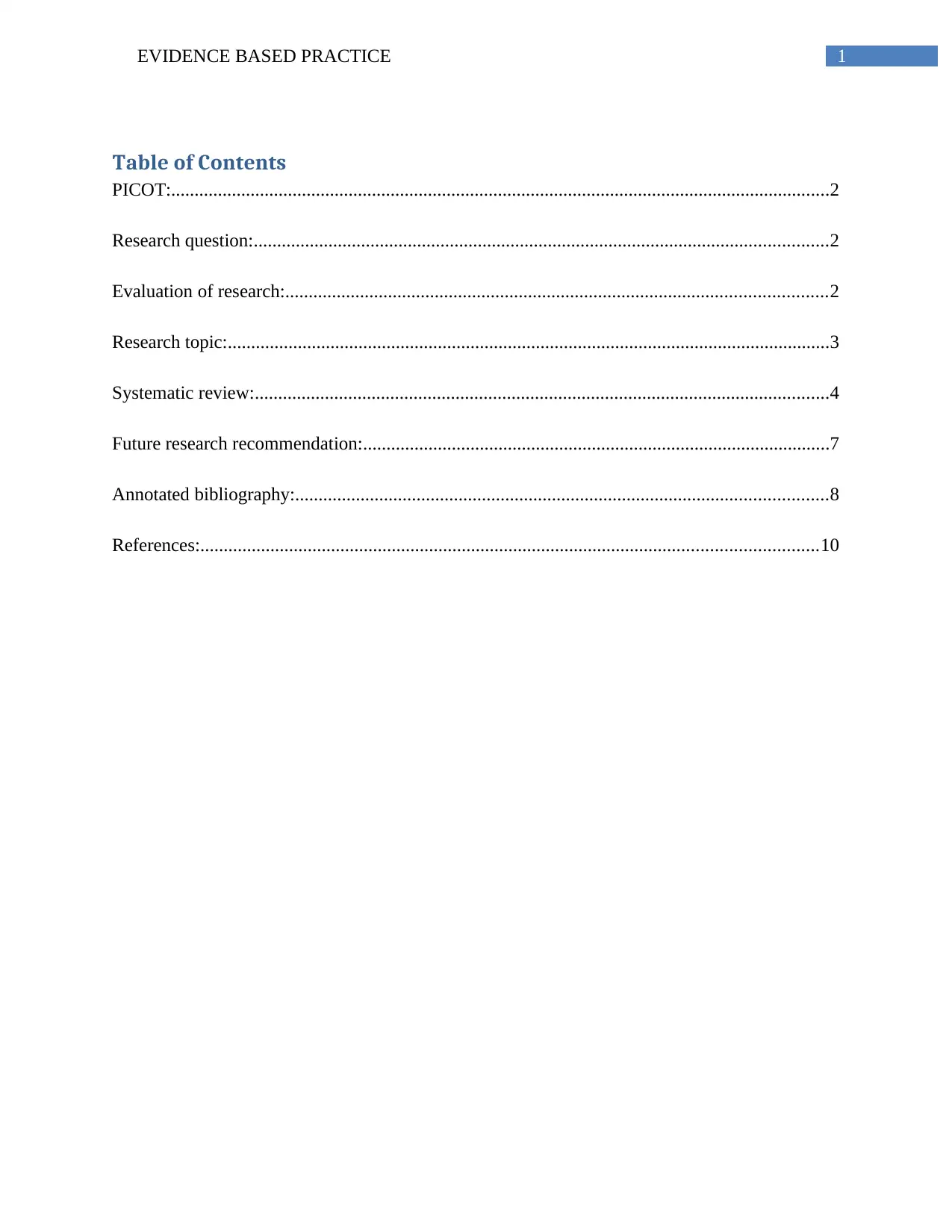
1EVIDENCE BASED PRACTICE
Table of Contents
PICOT:.............................................................................................................................................2
Research question:...........................................................................................................................2
Evaluation of research:....................................................................................................................2
Research topic:.................................................................................................................................3
Systematic review:...........................................................................................................................4
Future research recommendation:....................................................................................................7
Annotated bibliography:..................................................................................................................8
References:....................................................................................................................................10
Table of Contents
PICOT:.............................................................................................................................................2
Research question:...........................................................................................................................2
Evaluation of research:....................................................................................................................2
Research topic:.................................................................................................................................3
Systematic review:...........................................................................................................................4
Future research recommendation:....................................................................................................7
Annotated bibliography:..................................................................................................................8
References:....................................................................................................................................10
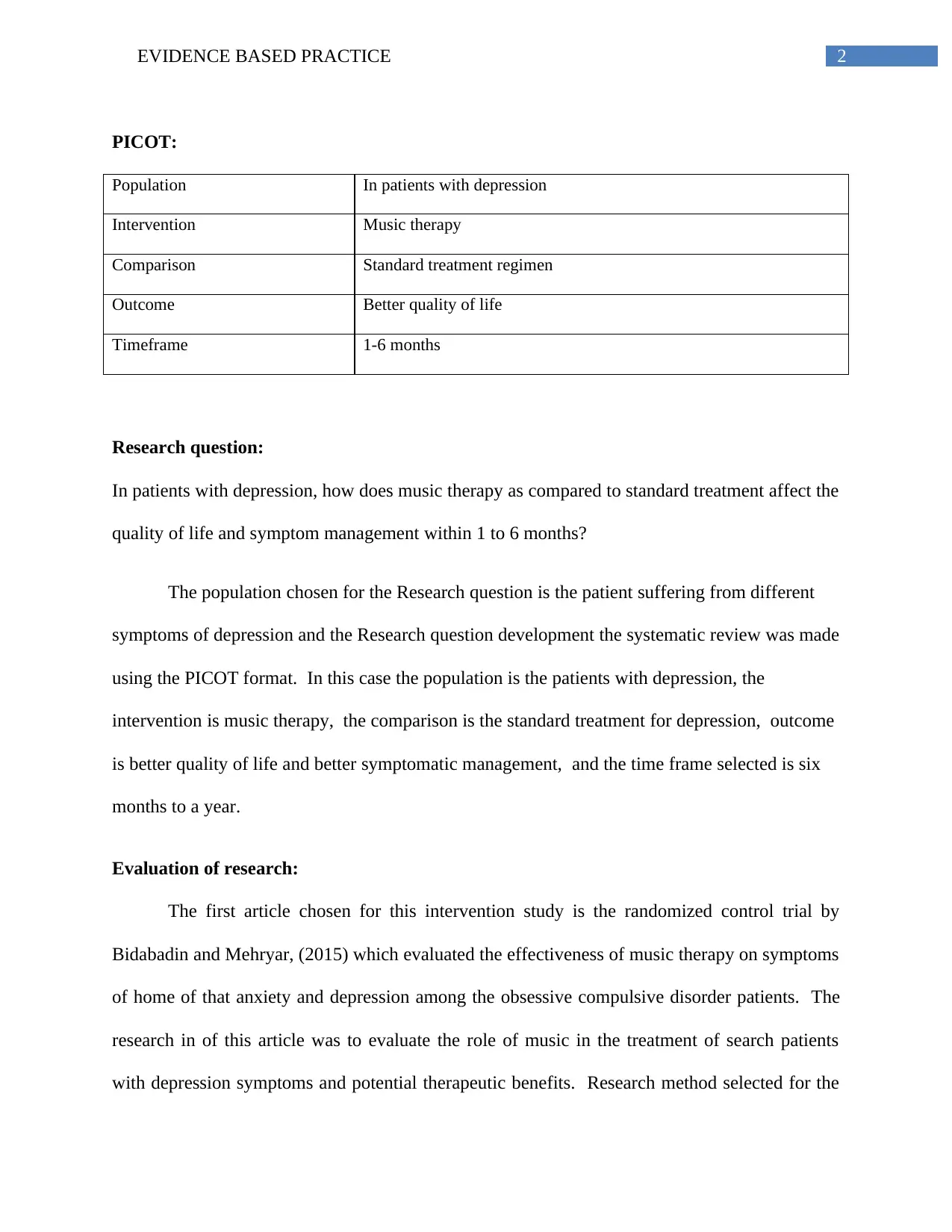
2EVIDENCE BASED PRACTICE
PICOT:
Population In patients with depression
Intervention Music therapy
Comparison Standard treatment regimen
Outcome Better quality of life
Timeframe 1-6 months
Research question:
In patients with depression, how does music therapy as compared to standard treatment affect the
quality of life and symptom management within 1 to 6 months?
The population chosen for the Research question is the patient suffering from different
symptoms of depression and the Research question development the systematic review was made
using the PICOT format. In this case the population is the patients with depression, the
intervention is music therapy, the comparison is the standard treatment for depression, outcome
is better quality of life and better symptomatic management, and the time frame selected is six
months to a year.
Evaluation of research:
The first article chosen for this intervention study is the randomized control trial by
Bidabadin and Mehryar, (2015) which evaluated the effectiveness of music therapy on symptoms
of home of that anxiety and depression among the obsessive compulsive disorder patients. The
research in of this article was to evaluate the role of music in the treatment of search patients
with depression symptoms and potential therapeutic benefits. Research method selected for the
PICOT:
Population In patients with depression
Intervention Music therapy
Comparison Standard treatment regimen
Outcome Better quality of life
Timeframe 1-6 months
Research question:
In patients with depression, how does music therapy as compared to standard treatment affect the
quality of life and symptom management within 1 to 6 months?
The population chosen for the Research question is the patient suffering from different
symptoms of depression and the Research question development the systematic review was made
using the PICOT format. In this case the population is the patients with depression, the
intervention is music therapy, the comparison is the standard treatment for depression, outcome
is better quality of life and better symptomatic management, and the time frame selected is six
months to a year.
Evaluation of research:
The first article chosen for this intervention study is the randomized control trial by
Bidabadin and Mehryar, (2015) which evaluated the effectiveness of music therapy on symptoms
of home of that anxiety and depression among the obsessive compulsive disorder patients. The
research in of this article was to evaluate the role of music in the treatment of search patients
with depression symptoms and potential therapeutic benefits. Research method selected for the
⊘ This is a preview!⊘
Do you want full access?
Subscribe today to unlock all pages.

Trusted by 1+ million students worldwide
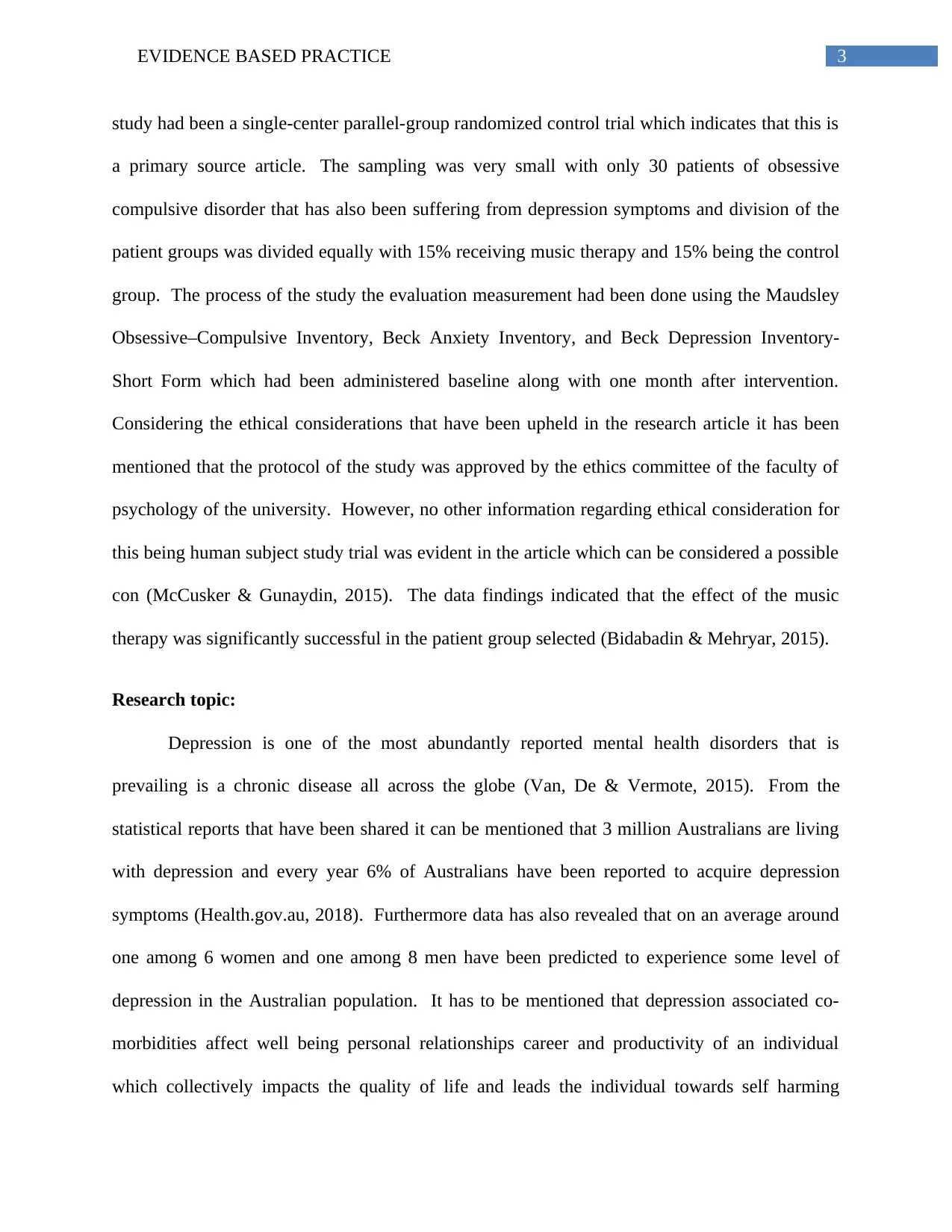
3EVIDENCE BASED PRACTICE
study had been a single-center parallel-group randomized control trial which indicates that this is
a primary source article. The sampling was very small with only 30 patients of obsessive
compulsive disorder that has also been suffering from depression symptoms and division of the
patient groups was divided equally with 15% receiving music therapy and 15% being the control
group. The process of the study the evaluation measurement had been done using the Maudsley
Obsessive–Compulsive Inventory, Beck Anxiety Inventory, and Beck Depression Inventory-
Short Form which had been administered baseline along with one month after intervention.
Considering the ethical considerations that have been upheld in the research article it has been
mentioned that the protocol of the study was approved by the ethics committee of the faculty of
psychology of the university. However, no other information regarding ethical consideration for
this being human subject study trial was evident in the article which can be considered a possible
con (McCusker & Gunaydin, 2015). The data findings indicated that the effect of the music
therapy was significantly successful in the patient group selected (Bidabadin & Mehryar, 2015).
Research topic:
Depression is one of the most abundantly reported mental health disorders that is
prevailing is a chronic disease all across the globe (Van, De & Vermote, 2015). From the
statistical reports that have been shared it can be mentioned that 3 million Australians are living
with depression and every year 6% of Australians have been reported to acquire depression
symptoms (Health.gov.au, 2018). Furthermore data has also revealed that on an average around
one among 6 women and one among 8 men have been predicted to experience some level of
depression in the Australian population. It has to be mentioned that depression associated co-
morbidities affect well being personal relationships career and productivity of an individual
which collectively impacts the quality of life and leads the individual towards self harming
study had been a single-center parallel-group randomized control trial which indicates that this is
a primary source article. The sampling was very small with only 30 patients of obsessive
compulsive disorder that has also been suffering from depression symptoms and division of the
patient groups was divided equally with 15% receiving music therapy and 15% being the control
group. The process of the study the evaluation measurement had been done using the Maudsley
Obsessive–Compulsive Inventory, Beck Anxiety Inventory, and Beck Depression Inventory-
Short Form which had been administered baseline along with one month after intervention.
Considering the ethical considerations that have been upheld in the research article it has been
mentioned that the protocol of the study was approved by the ethics committee of the faculty of
psychology of the university. However, no other information regarding ethical consideration for
this being human subject study trial was evident in the article which can be considered a possible
con (McCusker & Gunaydin, 2015). The data findings indicated that the effect of the music
therapy was significantly successful in the patient group selected (Bidabadin & Mehryar, 2015).
Research topic:
Depression is one of the most abundantly reported mental health disorders that is
prevailing is a chronic disease all across the globe (Van, De & Vermote, 2015). From the
statistical reports that have been shared it can be mentioned that 3 million Australians are living
with depression and every year 6% of Australians have been reported to acquire depression
symptoms (Health.gov.au, 2018). Furthermore data has also revealed that on an average around
one among 6 women and one among 8 men have been predicted to experience some level of
depression in the Australian population. It has to be mentioned that depression associated co-
morbidities affect well being personal relationships career and productivity of an individual
which collectively impacts the quality of life and leads the individual towards self harming
Paraphrase This Document
Need a fresh take? Get an instant paraphrase of this document with our AI Paraphraser
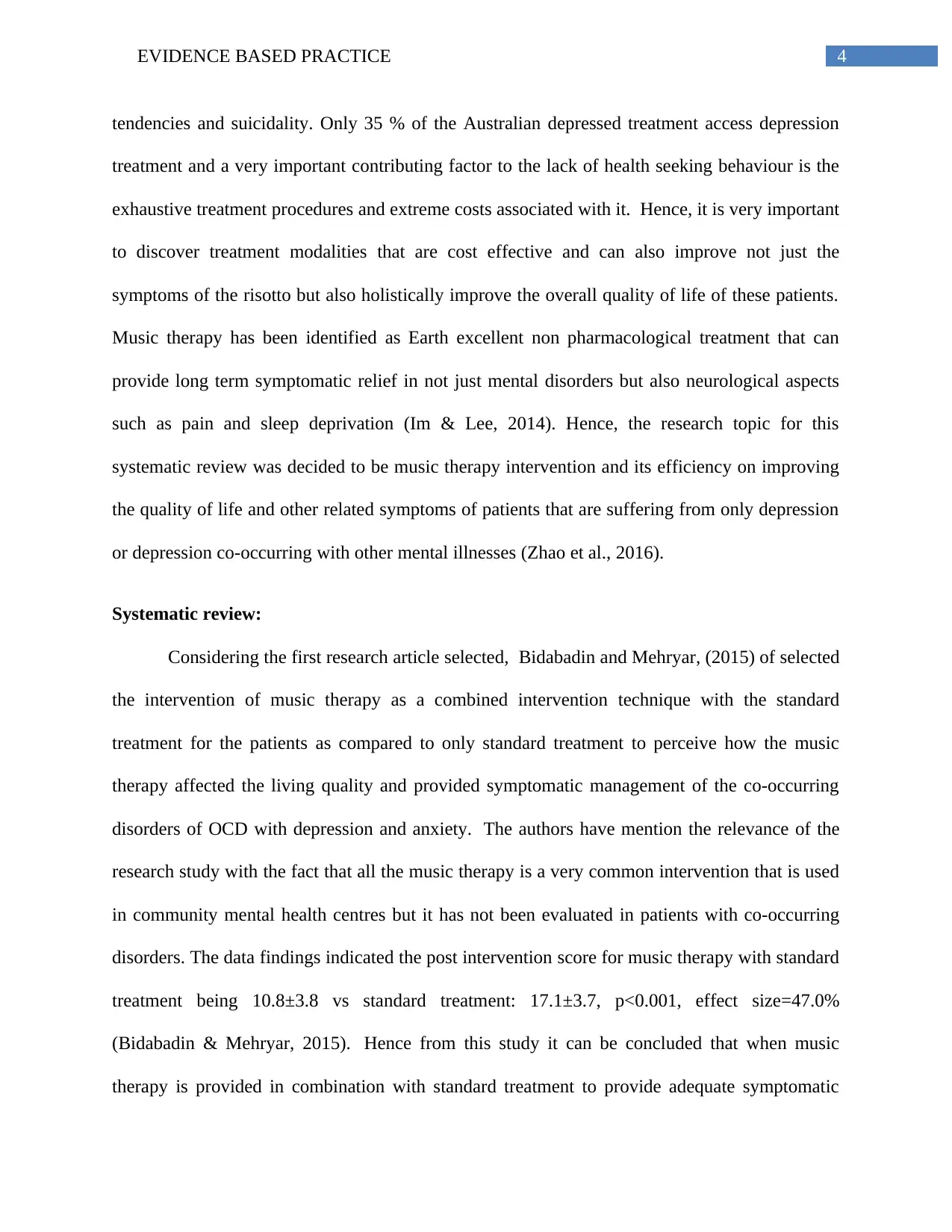
4EVIDENCE BASED PRACTICE
tendencies and suicidality. Only 35 % of the Australian depressed treatment access depression
treatment and a very important contributing factor to the lack of health seeking behaviour is the
exhaustive treatment procedures and extreme costs associated with it. Hence, it is very important
to discover treatment modalities that are cost effective and can also improve not just the
symptoms of the risotto but also holistically improve the overall quality of life of these patients.
Music therapy has been identified as Earth excellent non pharmacological treatment that can
provide long term symptomatic relief in not just mental disorders but also neurological aspects
such as pain and sleep deprivation (Im & Lee, 2014). Hence, the research topic for this
systematic review was decided to be music therapy intervention and its efficiency on improving
the quality of life and other related symptoms of patients that are suffering from only depression
or depression co-occurring with other mental illnesses (Zhao et al., 2016).
Systematic review:
Considering the first research article selected, Bidabadin and Mehryar, (2015) of selected
the intervention of music therapy as a combined intervention technique with the standard
treatment for the patients as compared to only standard treatment to perceive how the music
therapy affected the living quality and provided symptomatic management of the co-occurring
disorders of OCD with depression and anxiety. The authors have mention the relevance of the
research study with the fact that all the music therapy is a very common intervention that is used
in community mental health centres but it has not been evaluated in patients with co-occurring
disorders. The data findings indicated the post intervention score for music therapy with standard
treatment being 10.8±3.8 vs standard treatment: 17.1±3.7, p<0.001, effect size=47.0%
(Bidabadin & Mehryar, 2015). Hence from this study it can be concluded that when music
therapy is provided in combination with standard treatment to provide adequate symptomatic
tendencies and suicidality. Only 35 % of the Australian depressed treatment access depression
treatment and a very important contributing factor to the lack of health seeking behaviour is the
exhaustive treatment procedures and extreme costs associated with it. Hence, it is very important
to discover treatment modalities that are cost effective and can also improve not just the
symptoms of the risotto but also holistically improve the overall quality of life of these patients.
Music therapy has been identified as Earth excellent non pharmacological treatment that can
provide long term symptomatic relief in not just mental disorders but also neurological aspects
such as pain and sleep deprivation (Im & Lee, 2014). Hence, the research topic for this
systematic review was decided to be music therapy intervention and its efficiency on improving
the quality of life and other related symptoms of patients that are suffering from only depression
or depression co-occurring with other mental illnesses (Zhao et al., 2016).
Systematic review:
Considering the first research article selected, Bidabadin and Mehryar, (2015) of selected
the intervention of music therapy as a combined intervention technique with the standard
treatment for the patients as compared to only standard treatment to perceive how the music
therapy affected the living quality and provided symptomatic management of the co-occurring
disorders of OCD with depression and anxiety. The authors have mention the relevance of the
research study with the fact that all the music therapy is a very common intervention that is used
in community mental health centres but it has not been evaluated in patients with co-occurring
disorders. The data findings indicated the post intervention score for music therapy with standard
treatment being 10.8±3.8 vs standard treatment: 17.1±3.7, p<0.001, effect size=47.0%
(Bidabadin & Mehryar, 2015). Hence from this study it can be concluded that when music
therapy is provided in combination with standard treatment to provide adequate symptomatic
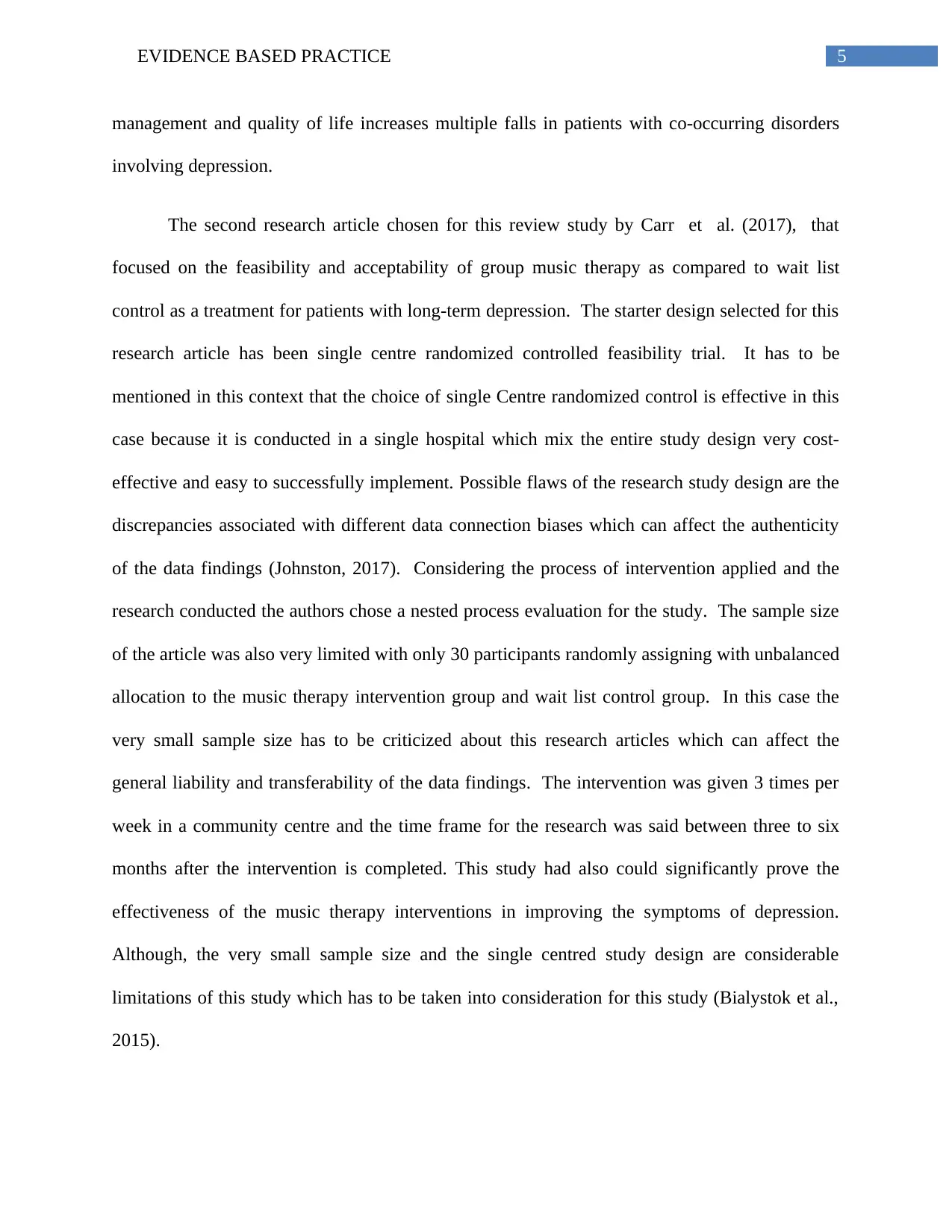
5EVIDENCE BASED PRACTICE
management and quality of life increases multiple falls in patients with co-occurring disorders
involving depression.
The second research article chosen for this review study by Carr et al. (2017), that
focused on the feasibility and acceptability of group music therapy as compared to wait list
control as a treatment for patients with long-term depression. The starter design selected for this
research article has been single centre randomized controlled feasibility trial. It has to be
mentioned in this context that the choice of single Centre randomized control is effective in this
case because it is conducted in a single hospital which mix the entire study design very cost-
effective and easy to successfully implement. Possible flaws of the research study design are the
discrepancies associated with different data connection biases which can affect the authenticity
of the data findings (Johnston, 2017). Considering the process of intervention applied and the
research conducted the authors chose a nested process evaluation for the study. The sample size
of the article was also very limited with only 30 participants randomly assigning with unbalanced
allocation to the music therapy intervention group and wait list control group. In this case the
very small sample size has to be criticized about this research articles which can affect the
general liability and transferability of the data findings. The intervention was given 3 times per
week in a community centre and the time frame for the research was said between three to six
months after the intervention is completed. This study had also could significantly prove the
effectiveness of the music therapy interventions in improving the symptoms of depression.
Although, the very small sample size and the single centred study design are considerable
limitations of this study which has to be taken into consideration for this study (Bialystok et al.,
2015).
management and quality of life increases multiple falls in patients with co-occurring disorders
involving depression.
The second research article chosen for this review study by Carr et al. (2017), that
focused on the feasibility and acceptability of group music therapy as compared to wait list
control as a treatment for patients with long-term depression. The starter design selected for this
research article has been single centre randomized controlled feasibility trial. It has to be
mentioned in this context that the choice of single Centre randomized control is effective in this
case because it is conducted in a single hospital which mix the entire study design very cost-
effective and easy to successfully implement. Possible flaws of the research study design are the
discrepancies associated with different data connection biases which can affect the authenticity
of the data findings (Johnston, 2017). Considering the process of intervention applied and the
research conducted the authors chose a nested process evaluation for the study. The sample size
of the article was also very limited with only 30 participants randomly assigning with unbalanced
allocation to the music therapy intervention group and wait list control group. In this case the
very small sample size has to be criticized about this research articles which can affect the
general liability and transferability of the data findings. The intervention was given 3 times per
week in a community centre and the time frame for the research was said between three to six
months after the intervention is completed. This study had also could significantly prove the
effectiveness of the music therapy interventions in improving the symptoms of depression.
Although, the very small sample size and the single centred study design are considerable
limitations of this study which has to be taken into consideration for this study (Bialystok et al.,
2015).
⊘ This is a preview!⊘
Do you want full access?
Subscribe today to unlock all pages.

Trusted by 1+ million students worldwide
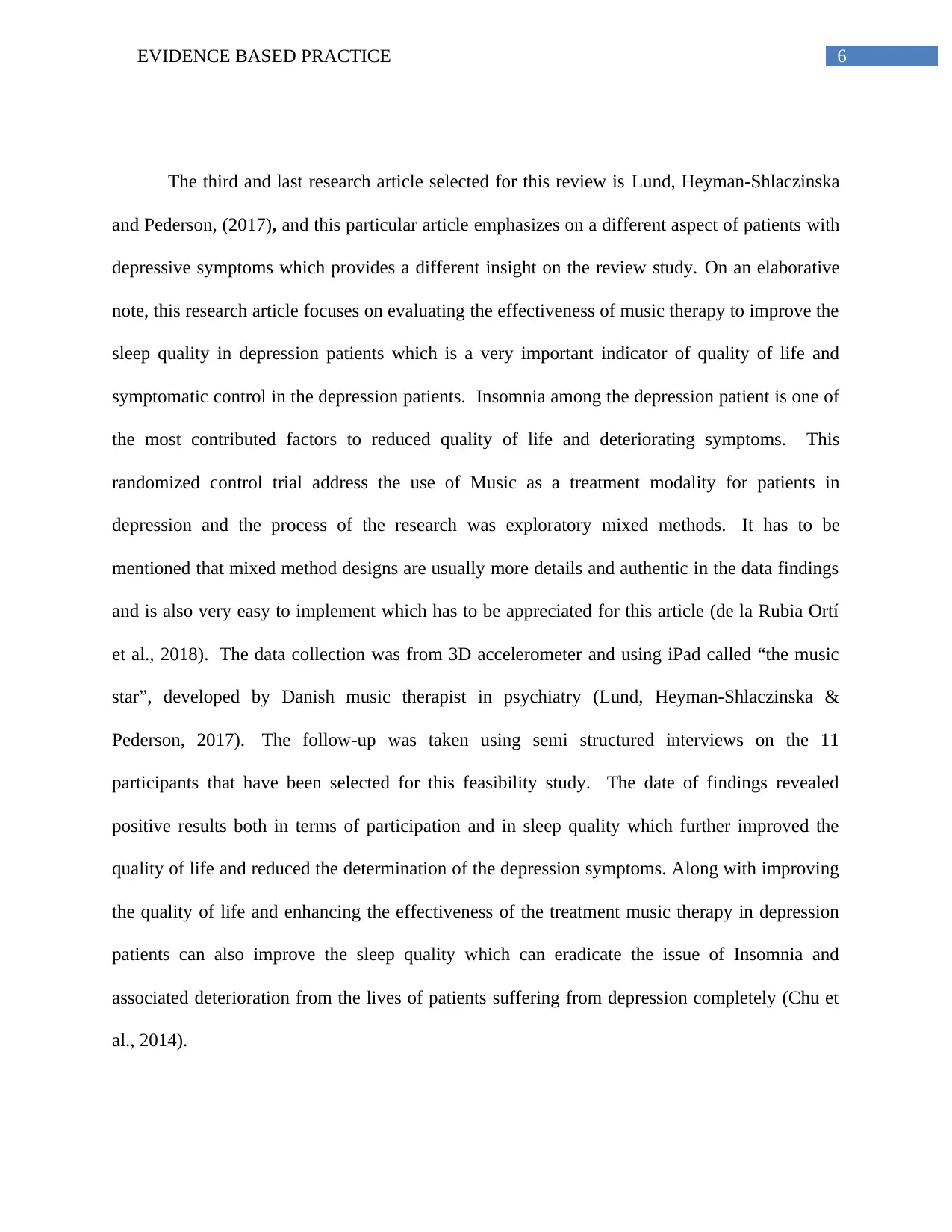
6EVIDENCE BASED PRACTICE
The third and last research article selected for this review is Lund, Heyman-Shlaczinska
and Pederson, (2017), and this particular article emphasizes on a different aspect of patients with
depressive symptoms which provides a different insight on the review study. On an elaborative
note, this research article focuses on evaluating the effectiveness of music therapy to improve the
sleep quality in depression patients which is a very important indicator of quality of life and
symptomatic control in the depression patients. Insomnia among the depression patient is one of
the most contributed factors to reduced quality of life and deteriorating symptoms. This
randomized control trial address the use of Music as a treatment modality for patients in
depression and the process of the research was exploratory mixed methods. It has to be
mentioned that mixed method designs are usually more details and authentic in the data findings
and is also very easy to implement which has to be appreciated for this article (de la Rubia Ortí
et al., 2018). The data collection was from 3D accelerometer and using iPad called “the music
star”, developed by Danish music therapist in psychiatry (Lund, Heyman-Shlaczinska &
Pederson, 2017). The follow-up was taken using semi structured interviews on the 11
participants that have been selected for this feasibility study. The date of findings revealed
positive results both in terms of participation and in sleep quality which further improved the
quality of life and reduced the determination of the depression symptoms. Along with improving
the quality of life and enhancing the effectiveness of the treatment music therapy in depression
patients can also improve the sleep quality which can eradicate the issue of Insomnia and
associated deterioration from the lives of patients suffering from depression completely (Chu et
al., 2014).
The third and last research article selected for this review is Lund, Heyman-Shlaczinska
and Pederson, (2017), and this particular article emphasizes on a different aspect of patients with
depressive symptoms which provides a different insight on the review study. On an elaborative
note, this research article focuses on evaluating the effectiveness of music therapy to improve the
sleep quality in depression patients which is a very important indicator of quality of life and
symptomatic control in the depression patients. Insomnia among the depression patient is one of
the most contributed factors to reduced quality of life and deteriorating symptoms. This
randomized control trial address the use of Music as a treatment modality for patients in
depression and the process of the research was exploratory mixed methods. It has to be
mentioned that mixed method designs are usually more details and authentic in the data findings
and is also very easy to implement which has to be appreciated for this article (de la Rubia Ortí
et al., 2018). The data collection was from 3D accelerometer and using iPad called “the music
star”, developed by Danish music therapist in psychiatry (Lund, Heyman-Shlaczinska &
Pederson, 2017). The follow-up was taken using semi structured interviews on the 11
participants that have been selected for this feasibility study. The date of findings revealed
positive results both in terms of participation and in sleep quality which further improved the
quality of life and reduced the determination of the depression symptoms. Along with improving
the quality of life and enhancing the effectiveness of the treatment music therapy in depression
patients can also improve the sleep quality which can eradicate the issue of Insomnia and
associated deterioration from the lives of patients suffering from depression completely (Chu et
al., 2014).
Paraphrase This Document
Need a fresh take? Get an instant paraphrase of this document with our AI Paraphraser
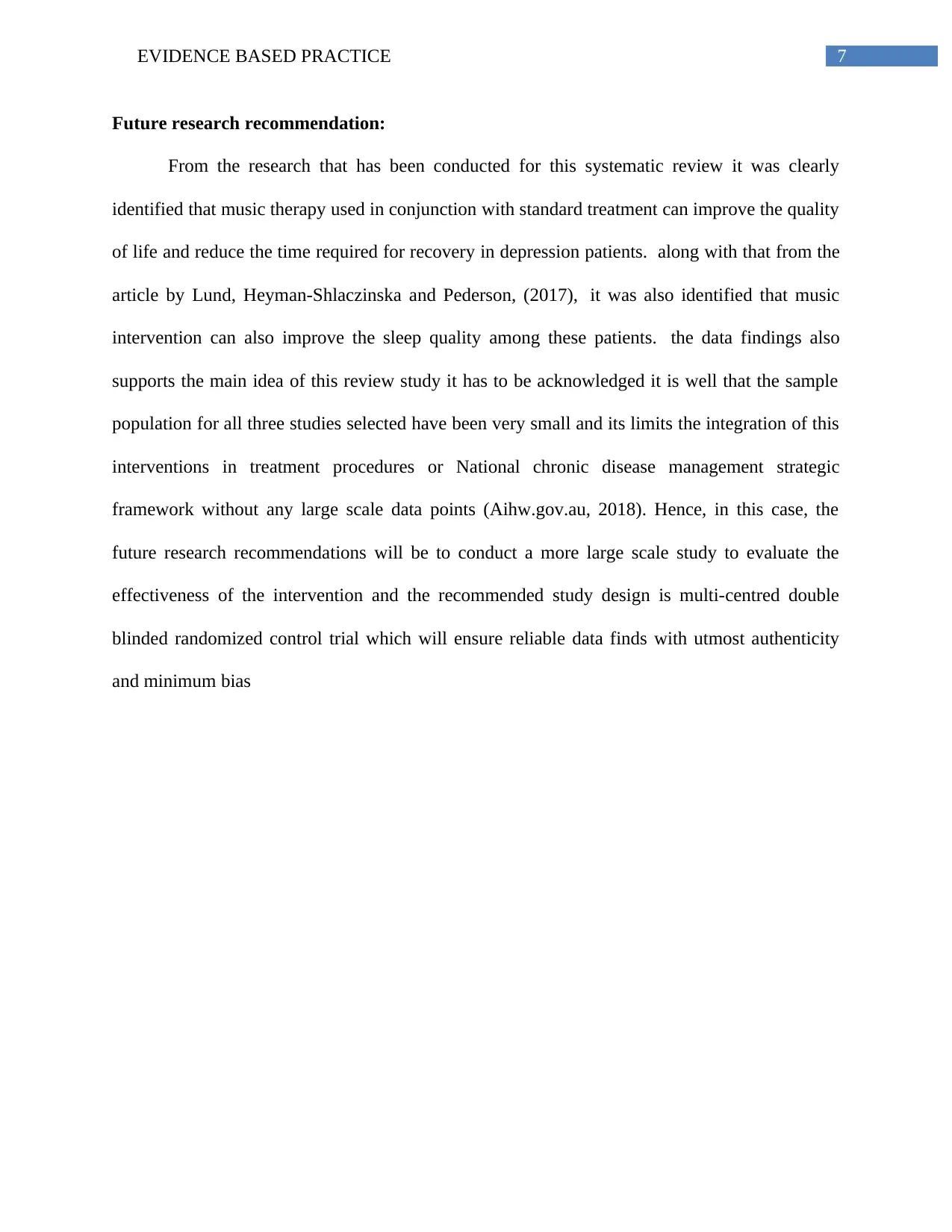
7EVIDENCE BASED PRACTICE
Future research recommendation:
From the research that has been conducted for this systematic review it was clearly
identified that music therapy used in conjunction with standard treatment can improve the quality
of life and reduce the time required for recovery in depression patients. along with that from the
article by Lund, Heyman-Shlaczinska and Pederson, (2017), it was also identified that music
intervention can also improve the sleep quality among these patients. the data findings also
supports the main idea of this review study it has to be acknowledged it is well that the sample
population for all three studies selected have been very small and its limits the integration of this
interventions in treatment procedures or National chronic disease management strategic
framework without any large scale data points (Aihw.gov.au, 2018). Hence, in this case, the
future research recommendations will be to conduct a more large scale study to evaluate the
effectiveness of the intervention and the recommended study design is multi-centred double
blinded randomized control trial which will ensure reliable data finds with utmost authenticity
and minimum bias
Future research recommendation:
From the research that has been conducted for this systematic review it was clearly
identified that music therapy used in conjunction with standard treatment can improve the quality
of life and reduce the time required for recovery in depression patients. along with that from the
article by Lund, Heyman-Shlaczinska and Pederson, (2017), it was also identified that music
intervention can also improve the sleep quality among these patients. the data findings also
supports the main idea of this review study it has to be acknowledged it is well that the sample
population for all three studies selected have been very small and its limits the integration of this
interventions in treatment procedures or National chronic disease management strategic
framework without any large scale data points (Aihw.gov.au, 2018). Hence, in this case, the
future research recommendations will be to conduct a more large scale study to evaluate the
effectiveness of the intervention and the recommended study design is multi-centred double
blinded randomized control trial which will ensure reliable data finds with utmost authenticity
and minimum bias
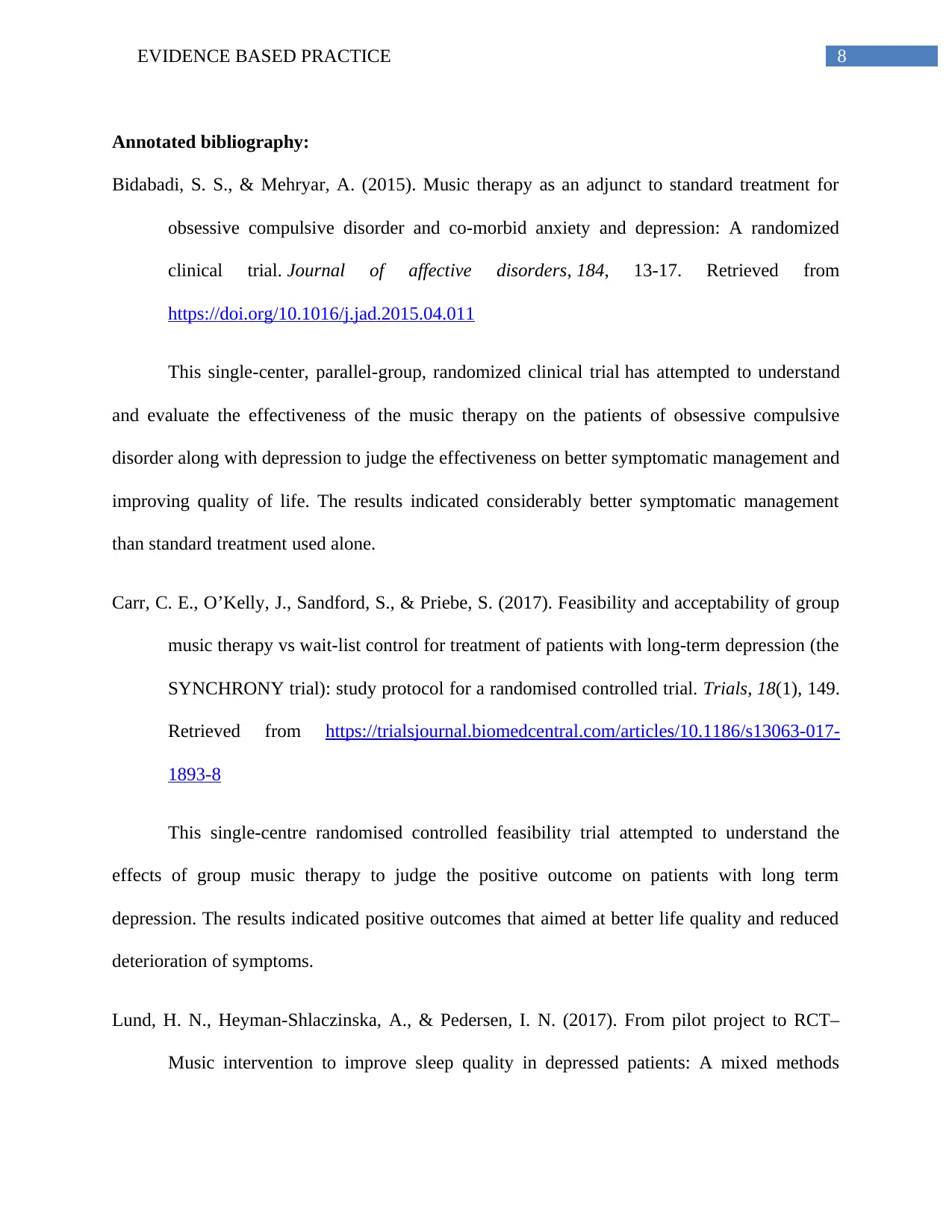
8EVIDENCE BASED PRACTICE
Annotated bibliography:
Bidabadi, S. S., & Mehryar, A. (2015). Music therapy as an adjunct to standard treatment for
obsessive compulsive disorder and co-morbid anxiety and depression: A randomized
clinical trial. Journal of affective disorders, 184, 13-17. Retrieved from
https://doi.org/10.1016/j.jad.2015.04.011
This single-center, parallel-group, randomized clinical trial has attempted to understand
and evaluate the effectiveness of the music therapy on the patients of obsessive compulsive
disorder along with depression to judge the effectiveness on better symptomatic management and
improving quality of life. The results indicated considerably better symptomatic management
than standard treatment used alone.
Carr, C. E., O’Kelly, J., Sandford, S., & Priebe, S. (2017). Feasibility and acceptability of group
music therapy vs wait-list control for treatment of patients with long-term depression (the
SYNCHRONY trial): study protocol for a randomised controlled trial. Trials, 18(1), 149.
Retrieved from https://trialsjournal.biomedcentral.com/articles/10.1186/s13063-017-
1893-8
This single-centre randomised controlled feasibility trial attempted to understand the
effects of group music therapy to judge the positive outcome on patients with long term
depression. The results indicated positive outcomes that aimed at better life quality and reduced
deterioration of symptoms.
Lund, H. N., Heyman-Shlaczinska, A., & Pedersen, I. N. (2017). From pilot project to RCT–
Music intervention to improve sleep quality in depressed patients: A mixed methods
Annotated bibliography:
Bidabadi, S. S., & Mehryar, A. (2015). Music therapy as an adjunct to standard treatment for
obsessive compulsive disorder and co-morbid anxiety and depression: A randomized
clinical trial. Journal of affective disorders, 184, 13-17. Retrieved from
https://doi.org/10.1016/j.jad.2015.04.011
This single-center, parallel-group, randomized clinical trial has attempted to understand
and evaluate the effectiveness of the music therapy on the patients of obsessive compulsive
disorder along with depression to judge the effectiveness on better symptomatic management and
improving quality of life. The results indicated considerably better symptomatic management
than standard treatment used alone.
Carr, C. E., O’Kelly, J., Sandford, S., & Priebe, S. (2017). Feasibility and acceptability of group
music therapy vs wait-list control for treatment of patients with long-term depression (the
SYNCHRONY trial): study protocol for a randomised controlled trial. Trials, 18(1), 149.
Retrieved from https://trialsjournal.biomedcentral.com/articles/10.1186/s13063-017-
1893-8
This single-centre randomised controlled feasibility trial attempted to understand the
effects of group music therapy to judge the positive outcome on patients with long term
depression. The results indicated positive outcomes that aimed at better life quality and reduced
deterioration of symptoms.
Lund, H. N., Heyman-Shlaczinska, A., & Pedersen, I. N. (2017). From pilot project to RCT–
Music intervention to improve sleep quality in depressed patients: A mixed methods
⊘ This is a preview!⊘
Do you want full access?
Subscribe today to unlock all pages.

Trusted by 1+ million students worldwide
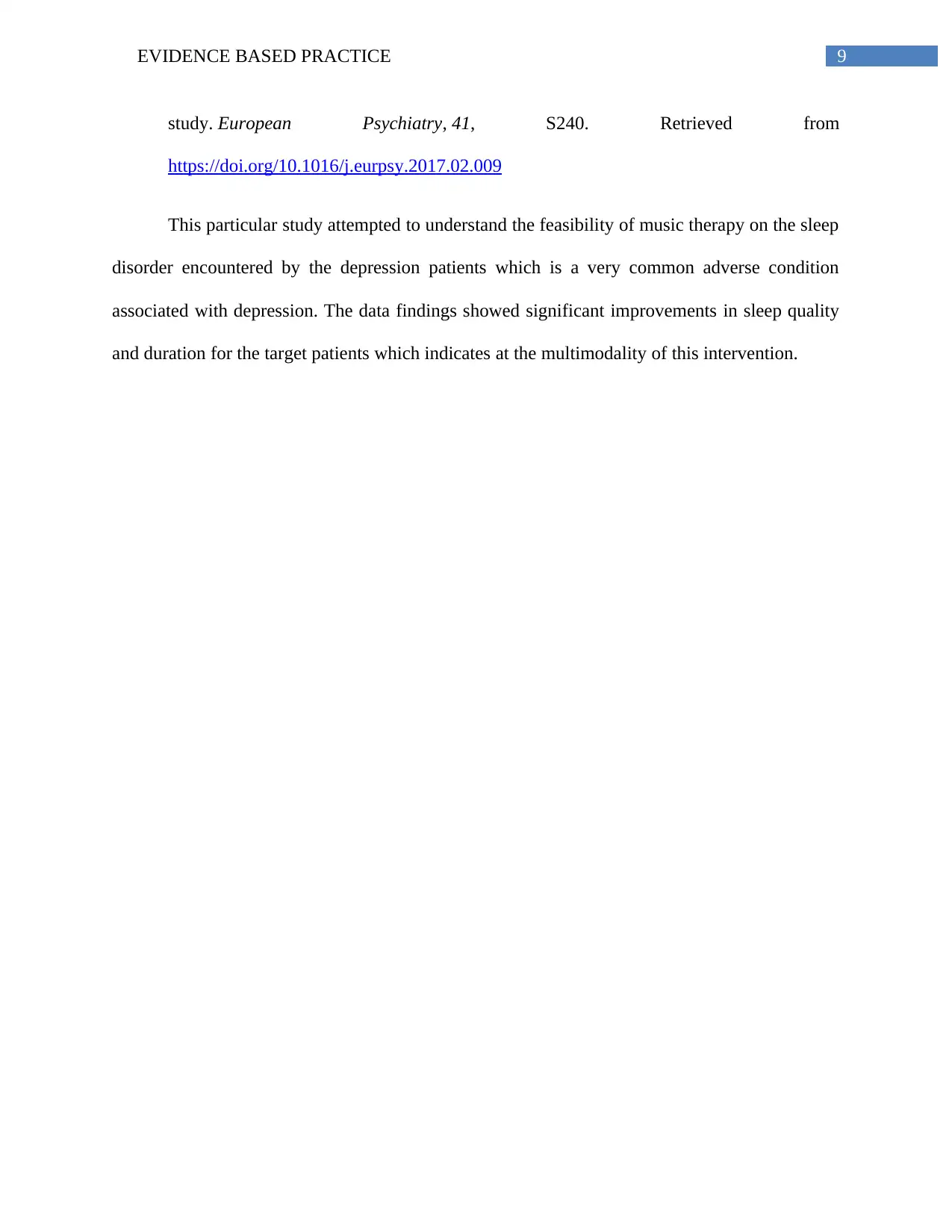
9EVIDENCE BASED PRACTICE
study. European Psychiatry, 41, S240. Retrieved from
https://doi.org/10.1016/j.eurpsy.2017.02.009
This particular study attempted to understand the feasibility of music therapy on the sleep
disorder encountered by the depression patients which is a very common adverse condition
associated with depression. The data findings showed significant improvements in sleep quality
and duration for the target patients which indicates at the multimodality of this intervention.
study. European Psychiatry, 41, S240. Retrieved from
https://doi.org/10.1016/j.eurpsy.2017.02.009
This particular study attempted to understand the feasibility of music therapy on the sleep
disorder encountered by the depression patients which is a very common adverse condition
associated with depression. The data findings showed significant improvements in sleep quality
and duration for the target patients which indicates at the multimodality of this intervention.
Paraphrase This Document
Need a fresh take? Get an instant paraphrase of this document with our AI Paraphraser
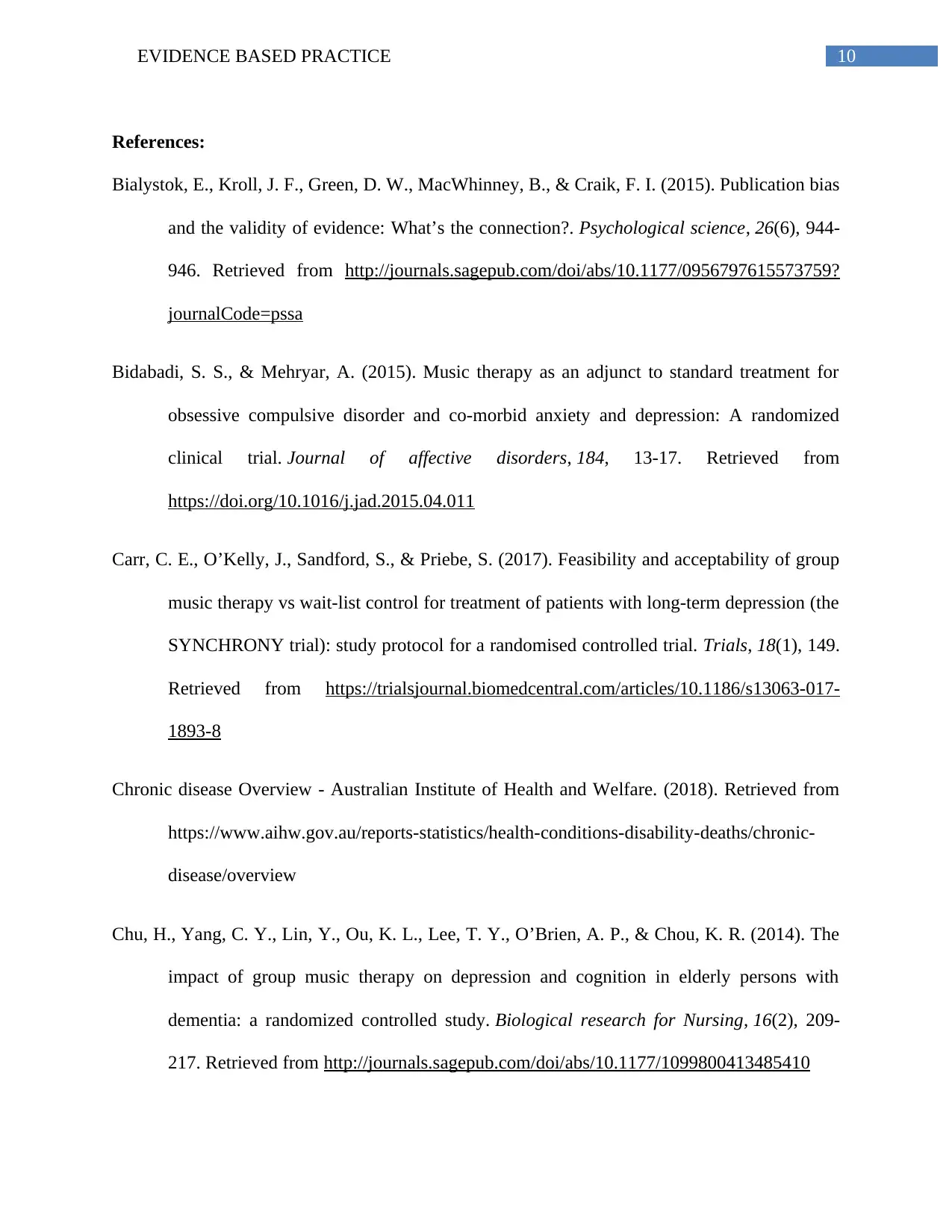
10EVIDENCE BASED PRACTICE
References:
Bialystok, E., Kroll, J. F., Green, D. W., MacWhinney, B., & Craik, F. I. (2015). Publication bias
and the validity of evidence: What’s the connection?. Psychological science, 26(6), 944-
946. Retrieved from http://journals.sagepub.com/doi/abs/10.1177/0956797615573759?
journalCode=pssa
Bidabadi, S. S., & Mehryar, A. (2015). Music therapy as an adjunct to standard treatment for
obsessive compulsive disorder and co-morbid anxiety and depression: A randomized
clinical trial. Journal of affective disorders, 184, 13-17. Retrieved from
https://doi.org/10.1016/j.jad.2015.04.011
Carr, C. E., O’Kelly, J., Sandford, S., & Priebe, S. (2017). Feasibility and acceptability of group
music therapy vs wait-list control for treatment of patients with long-term depression (the
SYNCHRONY trial): study protocol for a randomised controlled trial. Trials, 18(1), 149.
Retrieved from https://trialsjournal.biomedcentral.com/articles/10.1186/s13063-017-
1893-8
Chronic disease Overview - Australian Institute of Health and Welfare. (2018). Retrieved from
https://www.aihw.gov.au/reports-statistics/health-conditions-disability-deaths/chronic-
disease/overview
Chu, H., Yang, C. Y., Lin, Y., Ou, K. L., Lee, T. Y., O’Brien, A. P., & Chou, K. R. (2014). The
impact of group music therapy on depression and cognition in elderly persons with
dementia: a randomized controlled study. Biological research for Nursing, 16(2), 209-
217. Retrieved from http://journals.sagepub.com/doi/abs/10.1177/1099800413485410
References:
Bialystok, E., Kroll, J. F., Green, D. W., MacWhinney, B., & Craik, F. I. (2015). Publication bias
and the validity of evidence: What’s the connection?. Psychological science, 26(6), 944-
946. Retrieved from http://journals.sagepub.com/doi/abs/10.1177/0956797615573759?
journalCode=pssa
Bidabadi, S. S., & Mehryar, A. (2015). Music therapy as an adjunct to standard treatment for
obsessive compulsive disorder and co-morbid anxiety and depression: A randomized
clinical trial. Journal of affective disorders, 184, 13-17. Retrieved from
https://doi.org/10.1016/j.jad.2015.04.011
Carr, C. E., O’Kelly, J., Sandford, S., & Priebe, S. (2017). Feasibility and acceptability of group
music therapy vs wait-list control for treatment of patients with long-term depression (the
SYNCHRONY trial): study protocol for a randomised controlled trial. Trials, 18(1), 149.
Retrieved from https://trialsjournal.biomedcentral.com/articles/10.1186/s13063-017-
1893-8
Chronic disease Overview - Australian Institute of Health and Welfare. (2018). Retrieved from
https://www.aihw.gov.au/reports-statistics/health-conditions-disability-deaths/chronic-
disease/overview
Chu, H., Yang, C. Y., Lin, Y., Ou, K. L., Lee, T. Y., O’Brien, A. P., & Chou, K. R. (2014). The
impact of group music therapy on depression and cognition in elderly persons with
dementia: a randomized controlled study. Biological research for Nursing, 16(2), 209-
217. Retrieved from http://journals.sagepub.com/doi/abs/10.1177/1099800413485410
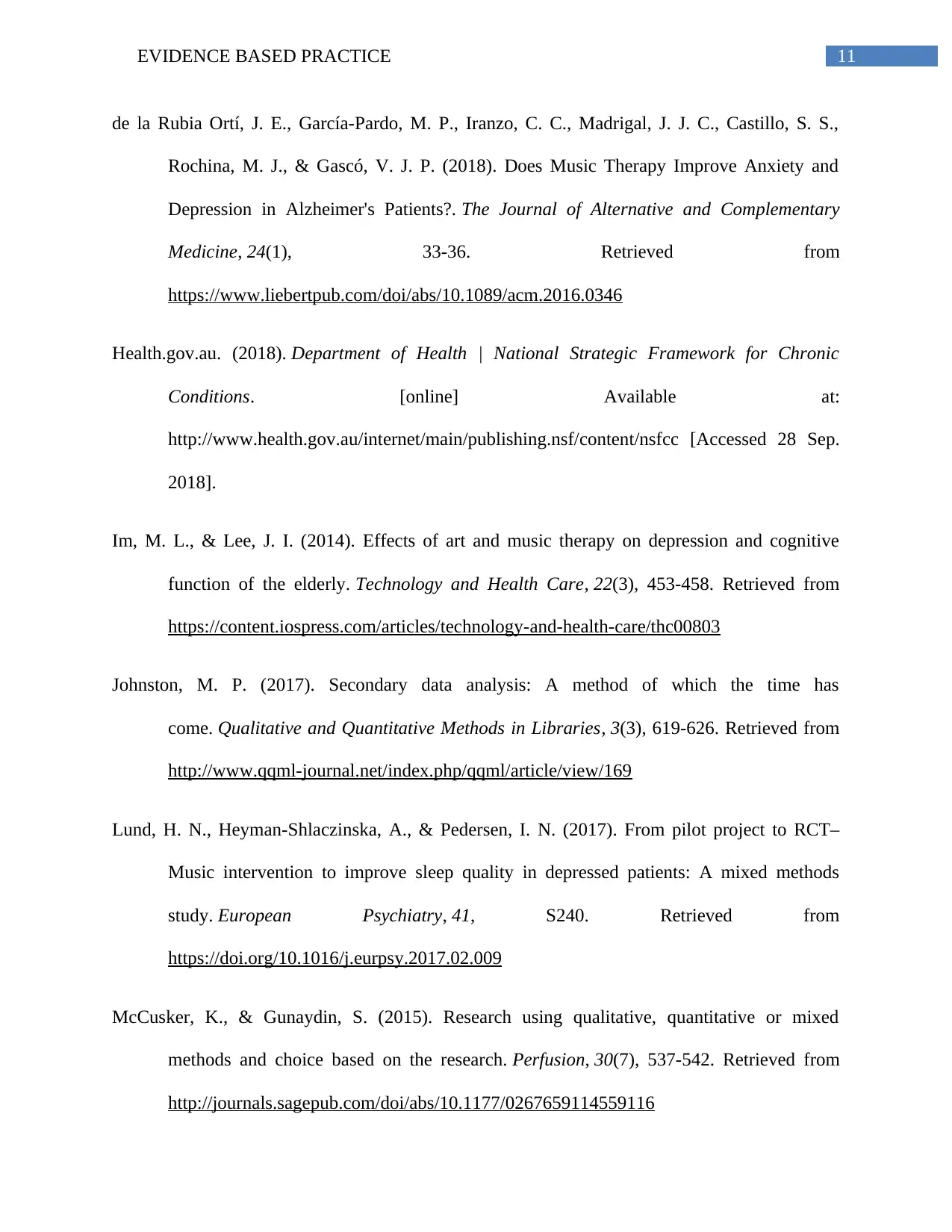
11EVIDENCE BASED PRACTICE
de la Rubia Ortí, J. E., García-Pardo, M. P., Iranzo, C. C., Madrigal, J. J. C., Castillo, S. S.,
Rochina, M. J., & Gascó, V. J. P. (2018). Does Music Therapy Improve Anxiety and
Depression in Alzheimer's Patients?. The Journal of Alternative and Complementary
Medicine, 24(1), 33-36. Retrieved from
https://www.liebertpub.com/doi/abs/10.1089/acm.2016.0346
Health.gov.au. (2018). Department of Health | National Strategic Framework for Chronic
Conditions. [online] Available at:
http://www.health.gov.au/internet/main/publishing.nsf/content/nsfcc [Accessed 28 Sep.
2018].
Im, M. L., & Lee, J. I. (2014). Effects of art and music therapy on depression and cognitive
function of the elderly. Technology and Health Care, 22(3), 453-458. Retrieved from
https://content.iospress.com/articles/technology-and-health-care/thc00803
Johnston, M. P. (2017). Secondary data analysis: A method of which the time has
come. Qualitative and Quantitative Methods in Libraries, 3(3), 619-626. Retrieved from
http://www.qqml-journal.net/index.php/qqml/article/view/169
Lund, H. N., Heyman-Shlaczinska, A., & Pedersen, I. N. (2017). From pilot project to RCT–
Music intervention to improve sleep quality in depressed patients: A mixed methods
study. European Psychiatry, 41, S240. Retrieved from
https://doi.org/10.1016/j.eurpsy.2017.02.009
McCusker, K., & Gunaydin, S. (2015). Research using qualitative, quantitative or mixed
methods and choice based on the research. Perfusion, 30(7), 537-542. Retrieved from
http://journals.sagepub.com/doi/abs/10.1177/0267659114559116
de la Rubia Ortí, J. E., García-Pardo, M. P., Iranzo, C. C., Madrigal, J. J. C., Castillo, S. S.,
Rochina, M. J., & Gascó, V. J. P. (2018). Does Music Therapy Improve Anxiety and
Depression in Alzheimer's Patients?. The Journal of Alternative and Complementary
Medicine, 24(1), 33-36. Retrieved from
https://www.liebertpub.com/doi/abs/10.1089/acm.2016.0346
Health.gov.au. (2018). Department of Health | National Strategic Framework for Chronic
Conditions. [online] Available at:
http://www.health.gov.au/internet/main/publishing.nsf/content/nsfcc [Accessed 28 Sep.
2018].
Im, M. L., & Lee, J. I. (2014). Effects of art and music therapy on depression and cognitive
function of the elderly. Technology and Health Care, 22(3), 453-458. Retrieved from
https://content.iospress.com/articles/technology-and-health-care/thc00803
Johnston, M. P. (2017). Secondary data analysis: A method of which the time has
come. Qualitative and Quantitative Methods in Libraries, 3(3), 619-626. Retrieved from
http://www.qqml-journal.net/index.php/qqml/article/view/169
Lund, H. N., Heyman-Shlaczinska, A., & Pedersen, I. N. (2017). From pilot project to RCT–
Music intervention to improve sleep quality in depressed patients: A mixed methods
study. European Psychiatry, 41, S240. Retrieved from
https://doi.org/10.1016/j.eurpsy.2017.02.009
McCusker, K., & Gunaydin, S. (2015). Research using qualitative, quantitative or mixed
methods and choice based on the research. Perfusion, 30(7), 537-542. Retrieved from
http://journals.sagepub.com/doi/abs/10.1177/0267659114559116
⊘ This is a preview!⊘
Do you want full access?
Subscribe today to unlock all pages.

Trusted by 1+ million students worldwide
1 out of 13
Related Documents
Your All-in-One AI-Powered Toolkit for Academic Success.
+13062052269
info@desklib.com
Available 24*7 on WhatsApp / Email
![[object Object]](/_next/static/media/star-bottom.7253800d.svg)
Unlock your academic potential
Copyright © 2020–2026 A2Z Services. All Rights Reserved. Developed and managed by ZUCOL.




